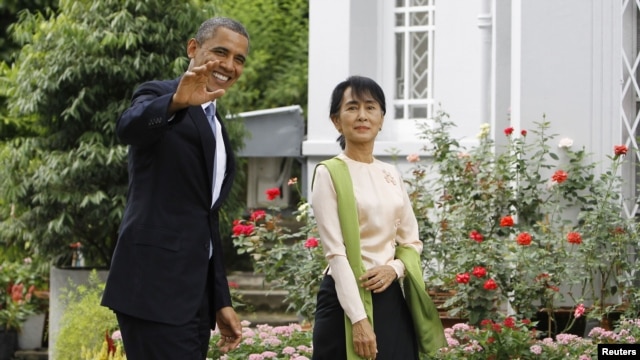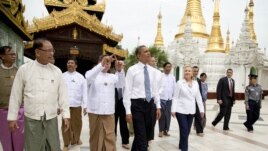Obama: Burma's Journey an Example for Asia, World
U.S.
President Barack Obama and Burma's pro-democracy leader Aung Sann Suu
Kyi meet at Suu Kyi's home in Rangoon, November 19, 2012.
Related Articles
TEXT SIZE
November 19, 2012
RANGOON, BURMA — In a historic visit to
Burma, U.S. President Barack Obama has acknowledged the beginning of
reforms, saying the United States will support democracy efforts,
economic development and efforts at national reconciliation.
In a speech at the University of Rangoon, Obama referred to a pledge he made at his presidential inauguration in 2009 to "extend a hand" to governments that ruled by fear if they are ready to "unclench their fist."
He reviewed a long history of U.S. - Burma relations, saying he came because of America's belief in human dignity. He said a dramatic transition is under way in Burma.
"Over the past year and a half, a dictatorship of five decades has loosened its grip. Under President Thein Sein, the desire for change has been met by an agenda for reform," said Obama. "A civilian now leads the government, and a parliament is asserting itself."
The president noted the release of some political prisoners, the National League for Democracy standing in the 2010 election, the banning of forced labor, new economic laws, and preliminary cease-fires with ethnic groups.
Saying he came to extend the hand of friendship, he noted the easing of U.S. sanctions and the appointment of a U.S. ambassador. But he cautioned that Burma has much further to go.
“This remarkable journey has just begun, and has much further to go," he said. "Reforms launched from the top of society must meet the aspirations of citizens who form its foundation. The flickers of progress that we have seen must not be extinguished, they must be strengthened, they must become a shining North Star for all this nation’s people."
The president listed freedoms the Burmese people should have, including freedom of assembly, worship and expression. He called for an end to media censorship.
Obama drew applause twice, once when he said no reform process can succeed without national reconciliation with ethnic groups. He also called for an end to violence against Rohingyas in Burma's Rakhine state.
Secretary of State Hillary Clinton accompanied Obama to Burma. Their motorcade drove down a road lined with thousands of people, including students holding U.S. and Burmese flags, and signs reading "Mr. Obama we love you."
At the parliament building, Obama met with President Thein Sein, a former general who has led reform steps.
"I shared with President Thein Sein our belief that the process of reform that he is taking is one that will move this country forward," he said.
In translated remarks, the Burmese president said relations had some disappointments and obstacles over the past two decades, but are now being repaired.
"I would like to reiterate our commitment to continue cooperation to strengthen our bilateral relations in the years to come," he said.
At the home of Aung San Suu Kyi, Obama praised her as a brave fighter for democracy. She said ongoing reforms will face difficult challenges.
Obama: "I especially want to thank Aung San Suu Kyi for welcoming me to her home. Here, through so many difficult years is where she displayed such unbreakable courage and determination. It is here where she showed that human freedom and dignity cannot be denied."
Suu Kyi: "The most difficult time in any transition is when we think that success is in sight. Then we have to be very careful that we are not lured by a mirage of success and that we are working toward genuine success for our people and for the friendship between our two countries."
In his speech, President Obama said Burma can serve as "a test of whether a country can transition to a better place" and as an example to others in the region.
"Here in Rangoon, I want to send a message across Asia: we don't need to be defined by the prisons of the past. We need to look forward to the future," he stated. "To the leadership of North Korea, I have offered a choice: let go of your nuclear weapons, and choose the path of peace and progress. If you do, you will find an extended hand from the United States of America."
In his Rangoon speech, Obama referred to the title of an essay and book by Aung San Suu Kyi: "Freedom from Fear."
The Burmese people, he said, are showing the world that fear does "not have to be the natural state of life in their country."
In a speech at the University of Rangoon, Obama referred to a pledge he made at his presidential inauguration in 2009 to "extend a hand" to governments that ruled by fear if they are ready to "unclench their fist."
He reviewed a long history of U.S. - Burma relations, saying he came because of America's belief in human dignity. He said a dramatic transition is under way in Burma.
"Over the past year and a half, a dictatorship of five decades has loosened its grip. Under President Thein Sein, the desire for change has been met by an agenda for reform," said Obama. "A civilian now leads the government, and a parliament is asserting itself."
The president noted the release of some political prisoners, the National League for Democracy standing in the 2010 election, the banning of forced labor, new economic laws, and preliminary cease-fires with ethnic groups.
Saying he came to extend the hand of friendship, he noted the easing of U.S. sanctions and the appointment of a U.S. ambassador. But he cautioned that Burma has much further to go.
“This remarkable journey has just begun, and has much further to go," he said. "Reforms launched from the top of society must meet the aspirations of citizens who form its foundation. The flickers of progress that we have seen must not be extinguished, they must be strengthened, they must become a shining North Star for all this nation’s people."
The president listed freedoms the Burmese people should have, including freedom of assembly, worship and expression. He called for an end to media censorship.
Obama drew applause twice, once when he said no reform process can succeed without national reconciliation with ethnic groups. He also called for an end to violence against Rohingyas in Burma's Rakhine state.
Secretary of State Hillary Clinton accompanied Obama to Burma. Their motorcade drove down a road lined with thousands of people, including students holding U.S. and Burmese flags, and signs reading "Mr. Obama we love you."
At the parliament building, Obama met with President Thein Sein, a former general who has led reform steps.
"I shared with President Thein Sein our belief that the process of reform that he is taking is one that will move this country forward," he said.
In translated remarks, the Burmese president said relations had some disappointments and obstacles over the past two decades, but are now being repaired.
"I would like to reiterate our commitment to continue cooperation to strengthen our bilateral relations in the years to come," he said.
At the home of Aung San Suu Kyi, Obama praised her as a brave fighter for democracy. She said ongoing reforms will face difficult challenges.
Obama: "I especially want to thank Aung San Suu Kyi for welcoming me to her home. Here, through so many difficult years is where she displayed such unbreakable courage and determination. It is here where she showed that human freedom and dignity cannot be denied."
Suu Kyi: "The most difficult time in any transition is when we think that success is in sight. Then we have to be very careful that we are not lured by a mirage of success and that we are working toward genuine success for our people and for the friendship between our two countries."
In his speech, President Obama said Burma can serve as "a test of whether a country can transition to a better place" and as an example to others in the region.
"Here in Rangoon, I want to send a message across Asia: we don't need to be defined by the prisons of the past. We need to look forward to the future," he stated. "To the leadership of North Korea, I have offered a choice: let go of your nuclear weapons, and choose the path of peace and progress. If you do, you will find an extended hand from the United States of America."
In his Rangoon speech, Obama referred to the title of an essay and book by Aung San Suu Kyi: "Freedom from Fear."
The Burmese people, he said, are showing the world that fear does "not have to be the natural state of life in their country."



ไม่มีความคิดเห็น:
แสดงความคิดเห็น